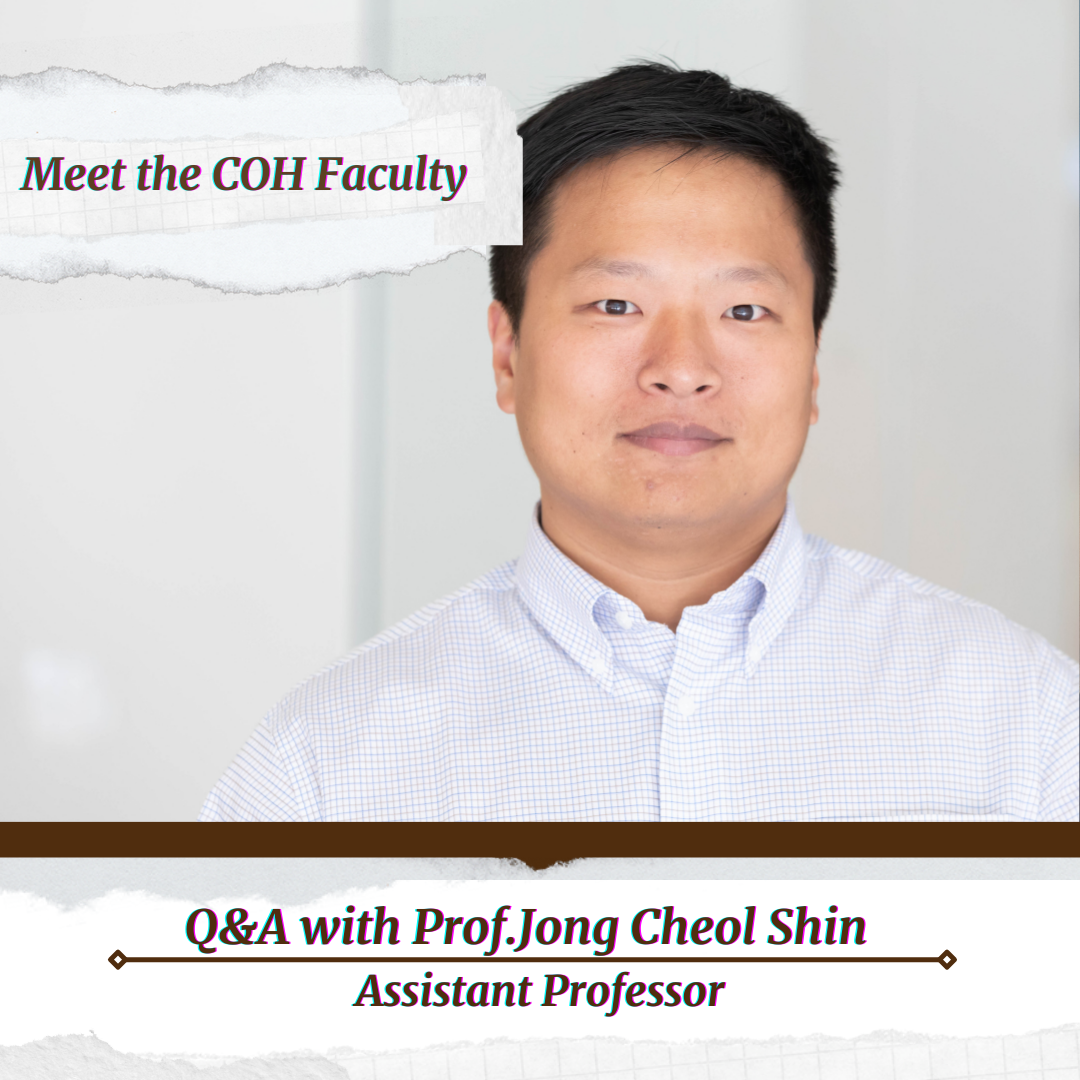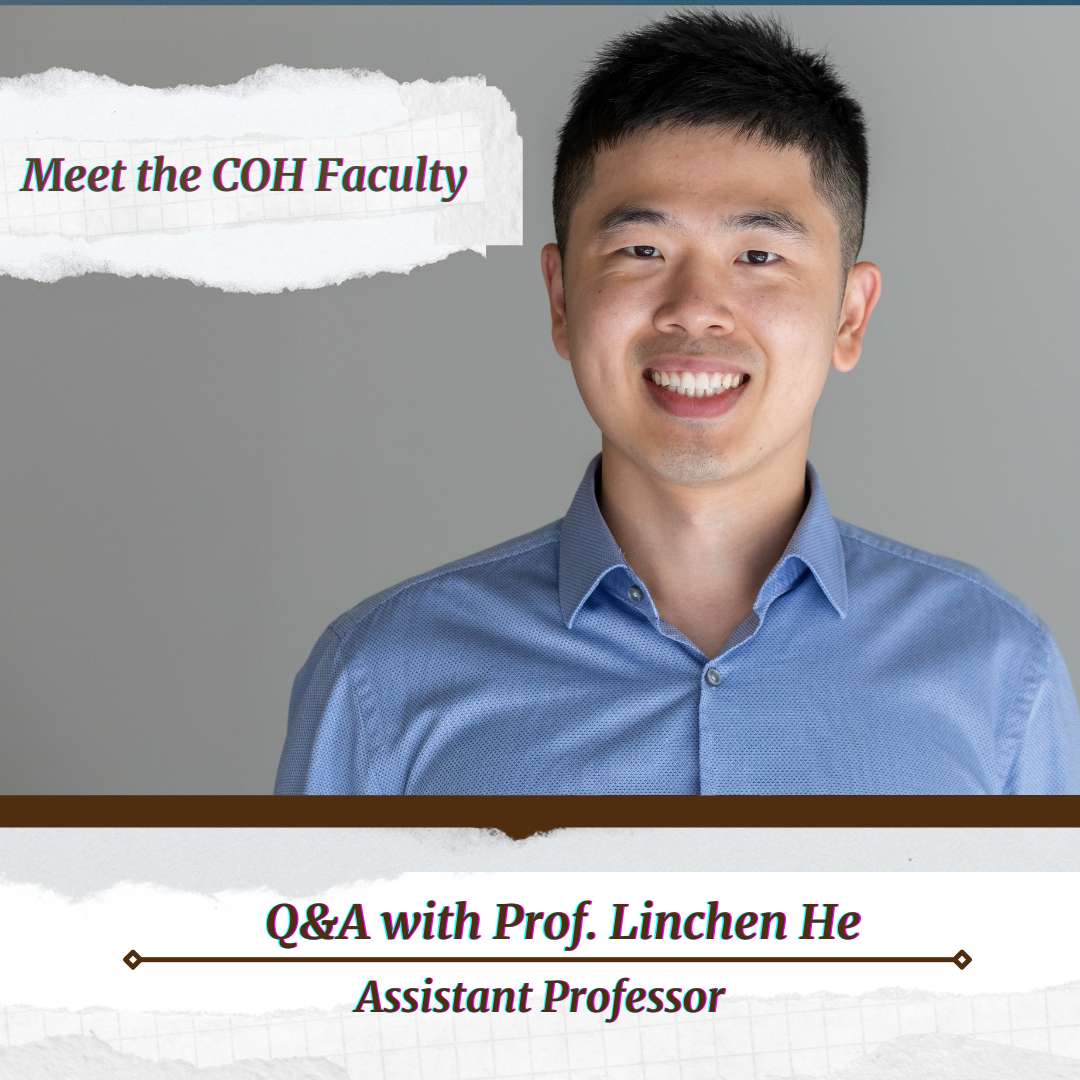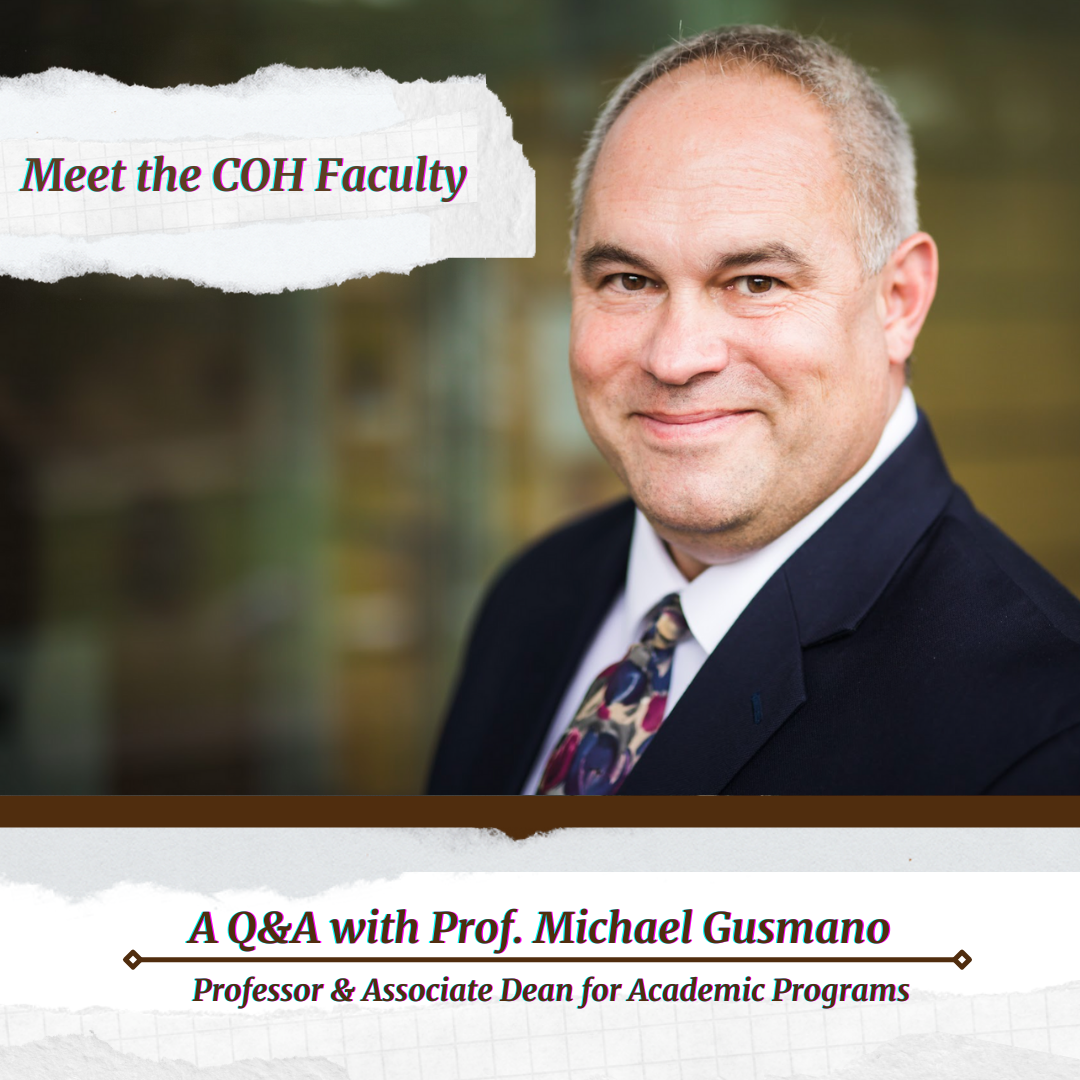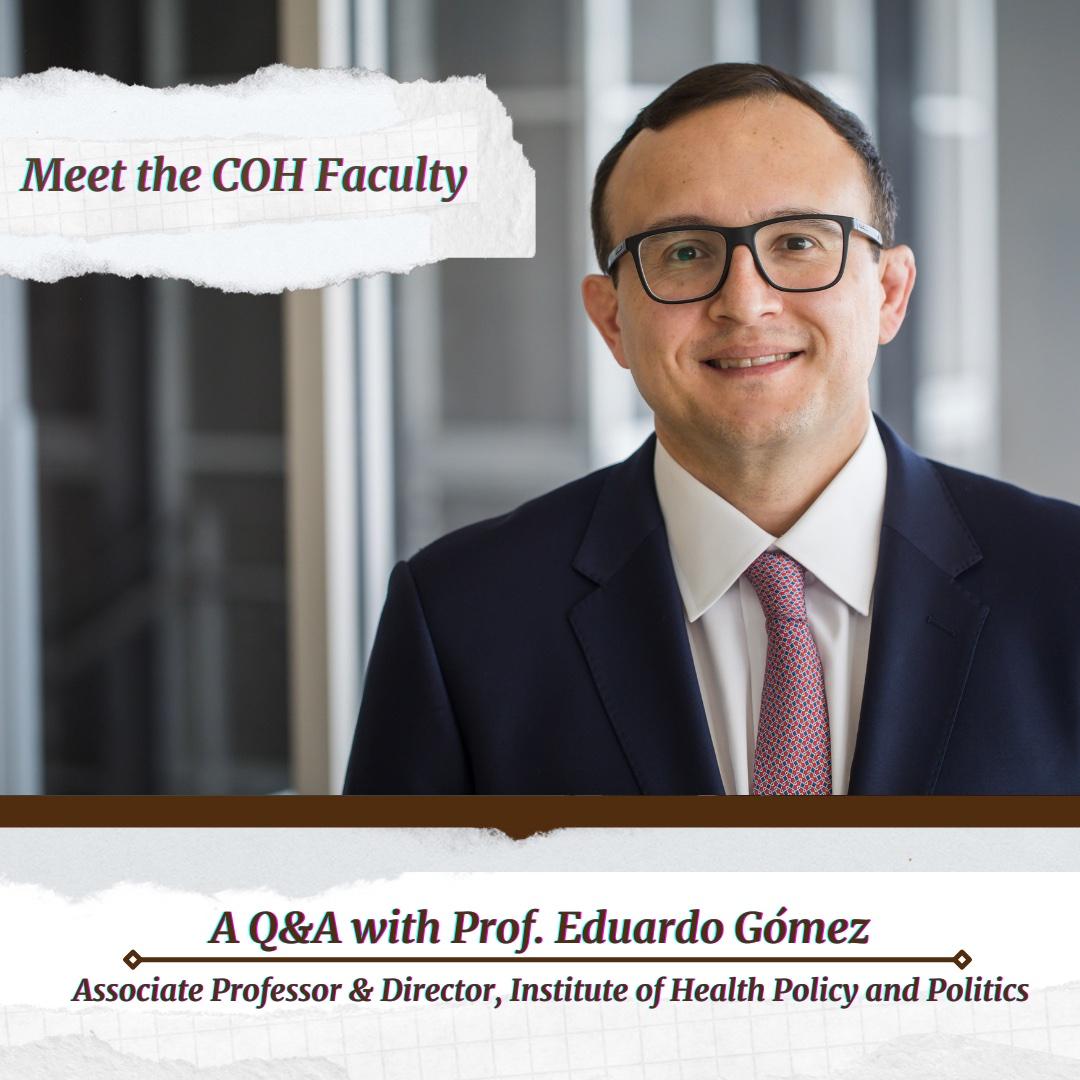
Faculty profile: Meet Jong Cheol Shin
By Max DeCaro '25
Dr. Jong Cheol Shin is an Assistant Professor at Lehigh University’s College of Health. Dr. Shin grew up in Seoul, South Korea. He obtained two bachelor’s degrees, a B.S. in Sports Medicine and a B.S. in Physics, at Kyung Hee University, and two master’s degrees, an M.S. in Kinesiology and an M.S. in Applied Statistics at the University of Illinois at Urbana-Champaign in 2015 and 2017 respectively. He received his Ph.D. in Community Health also at the University of Illinois at Urbana-Champaign in 2019, and was a postdoctoral research associate at Brown University School of Public Health from 2019 to 2022. Dr. Shin’s primary areas of focus are physical activity and sleep. His research implements new technologies, particularly mobile technologies, in order to track these measures and denote environmental exposures, as well as investigates the accuracy of sleep-tracking technologies. Dr. Shin’s work helps to provide important insights into the effects of sleep and physical activity on health outcomes such as obesity and diabetes.
Q: What did your educational journey look like?
Dr. Shin: I started my educational program in physics, so have a scientific background. When I was a sophomore, I thought about what kind of job I wanted to do — a physical job? Industry job? So I thought about two things: what I really liked, and what I am good at. In terms of physics, it’s really interesting but I wasn’t sure that I’m really good at physics. Movement and physical activity were one of my most interesting topics, so I double majored in sports medicine. Especially, I was also interested in exercise and physical activity because I was the team coach for the university judo team. After that, I decided that I was going to do things that were very interesting to me, so I started my master's in kinesiology. At that moment, I acquired various technologies to measure and capture those movements for later on, and I really wanted to learn more about how this technology and how these activities influenced health. So, that is why I pursued my degree as a community health major. I also pursued another master’s degree in applied statistics because statistics is a very good tool and an important language for talking about quantitative research.
During my Ph.D. program, I kept doing some measuring of physical activity and sleep and its influences on health, but also how environmental exposure can influence sleep. I knew that daily exposure and physical activity had consequences on sleep, so I kept much of my research surrounding epidemiological research, but also into assessment methods using technology. Based on my skill sets and knowledge, I worked as a postdoctoral researcher at Brown University. A majority of my work was using GIS and similar technologies like handheld and wearable devices and was focused on data analysis. Looking back, all of these fields were very different — physics, sports medicine, kinesiology, ... — so everything looks like a different silo. However, my major goal was sleep and physical activity, and trying to get the training from outside of that field absolutely helped me to have a better sense to redefine problems and reach solutions based on a new understanding of complex situations. So, simply say, my education journal was interdisciplinarity. Q: What did you do before joining Lehigh? Dr. Shin: Right before I came to Lehigh I was a postdoctoral researcher at Brown University School of Public Health. My title was researcher associate, and I worked writing manuscripts, writing grants, and doing research and data collection. I also did some advising and mentoring for undergraduate students, helping them with methods and how to analyze methods, so teaching and advising were part of my role even as a researcher. I worked there through the pandemic.
Q: What influenced your decision to come to Lehigh, and how has that transition been?
Dr. Shin: There were several reasons. Lehigh has a brand new college, and I’m really happy to see that. The position was really exciting — I really liked the balance between teaching and research. I really enjoy doing research, but am also eager to do some work with the students, and as just a researcher that kind of work is limited. Lehigh has a lot of variation in teaching, while typically most institutions only have either a research or a teaching position — here there is a really good balance between research and teaching. When I came for the job interview, I was really impressed by all of the talented students, they were really active and really passionate. All of that is really fascinating to me, so that’s one of the reasons I chose to come here. The environment is also really positive, everybody is doing something, not for their career, but rather to do something good. So those are the reasons I chose to come here.
Q: Has the greater Lehigh Valley surprised you? If so, in what ways?
Dr. Shin: That’s a tough question! I’ve been here only six months, so I’m still learning about the community, but there are always pros and cons. Obviously, the College of Health, being new, is new in working with the community, but there are a lot of people working together, not just in the College but also in the community. There may not be a lot of projects open right now, but there are a lot of people who want to start that work! Southside Bethlehem wants to help do good in their community, so that has also been one thing that has impressed me. I’m still learning about the Lehigh community, and it is exciting that every single time I talk with them about research ideas, they are doing something. It has been exciting to learn and exciting to see how much passion there is in everyone in the community. Q: How has the newness and growth of the College affected your work and time here? Dr. Shin: Here at Lehigh, there is a lot of collaborative work and research. The dynamic is not limited to the College of Health, but extends across the entire campus. As a new college, the active collaborative environment and the innovative ideas and vision within the College of Health inspire and motivate my research work. Furthermore, the effective collaboration will be crucial in helping us achieve our goals on time. As the department grows, new people with new ideas come in, which is a benefit of having a new college. The supportive environment and resources are also so important components, at Lehigh, we have a unique environment that offers unparalleled potential!
Q: What is the focus and context of your research?
Dr. Shin: My current research focuses on a couple of different topics, but the one I am really interested in now is how to integrate new technologies, such as GPS, wearables, and mobile technologies, and what the association is between these and environmental exposure and physical activity. Based on that, I am interested in developing some optimized and individualized interventions, on top of health and sleep promotion. In terms of environmental exposures, often the GPS and other technologies can help show how the built environment and neighborhoods can have an impact on health and inform research questions.
Q: What classes are you currently teaching, and what classes do you plan on/hope to
teach in the future?
Dr. Shin: Right now I am teaching Introduction to Population Health, which is a basic level introductory course, and also Spacial Epidemiology, which is mapping and spatial relationships using GIS technology. For the upcoming semester, I plan to teach Sleep and Physical Activity in Population Health in addition to Spatial Epidemiology. This course will focus on the benefits of physical activity and sleep and their applications in health promotion. If I have the chance, I also want to teach about health technology and applications. Specifically, I would cover topics such as how to apply and measure technology, the types of findings that can be obtained using technology, and ways to improve upon those technologies. I believe that teaching such a course would be beneficial to students and help them stay up-to-date with the latest advancements in the field.
Q: How are/can students be involved in your work and research?
Dr. Shin: That is a good question, and also one that I ask myself! In terms of the classroom setting, for freshmen, I want to make sure that students are getting a broad experience of higher education, and so that is why I combine all sorts of things — group [and individual] projects, presentations, exams, discussions, so no focus on only one thing. In my upper level courses, there is no final, the final grade is based on their project where they build up their own research ideas and questions about public health issues, map out those issues, create an outline, those sorts of things. I want to teach them how to make some sort of product that is interesting in health science. And so that is one of the ways that I help engage students through the courses. For my research, I do both [in-lab] research and work in the community, so staying at the boundary between lab-based and community-based research. So when I do some data collection, I need participants and can teach them how data collection works. Some students are interested in organizing data and developing theory, and working together we can work on research reviews, writing manuscripts, and things like that. We also have great staff in the College of Health who help organize College-oriented student activities which is a great way to get the students and staff together!
Q: What are your hobbies?
Dr. Shin: I love sports, and my priority is judo. I train in a few different sports: taekwondo, judo, all of them I am a black belt. During my Ph.D. program, I led my judo team and we got a championship! I really enjoy martial arts and expecting to share an experience with Lehigh Students. Also, working with students on my research is also a hobby.
Q: Cats or dogs?
Dr. Shin: Personally, dogs are more familiar to me, so dogs! I do like cats too, though.


